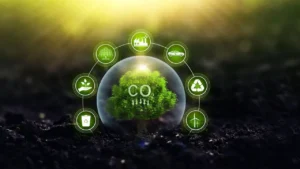Energy Efficiency Strategies for Business: How to Plan, Prioritize, and Perform?
In today’s rapidly evolving business landscape, companies can no longer afford to view energy efficiency as a secondary concern. Instead, it has become a strategic priority — one that directly influences operational costs, stakeholder trust, regulatory compliance, and long-term sustainability.
At Efficient Concepts Management Consultancy, we specialize in helping organizations unlock the full potential of energy efficiency. Our solutions drive measurable performance gains, enhance profitability, and support ESG commitments — all while contributing to a greener, more resilient future.
But why exactly should businesses prioritize energy efficiency today more than ever before?
Let’s explore.
What Is Energy Efficiency?
Energy efficiency refers to the practice of using less energy to perform the same task or produce the same outcome. It’s about optimizing energy consumption without compromising output — achieving more with less.
From advanced technologies to strategic operational changes, businesses can drastically cut down on wasted energy, lower utility bills, and minimize their environmental impact by embedding efficiency into their core operations.
How Does Energy Efficiency Work?
Energy efficiency works through a combination of technical upgrades and behavioral shifts that collectively reduce unnecessary energy usage. Key pillars include:
- Technology Upgrades: Replacing outdated systems with high-efficiency alternatives such as LED lighting, HVAC smart motors, and optimized industrial machinery.
- Building Improvements: Enhancing insulation, sealing leaks, and installing energy-smart windows to prevent unnecessary heating or cooling losses.
- Smart Energy Management: Implementing IoT-based monitoring and control systems that dynamically adjust energy usage based on real-time occupancy and environmental data.
- Operational Adjustments: Streamlining processes and fostering employee energy-saving behaviors across the organization.
Each step contributes to a substantial reduction in overall energy consumption — and, critically, to the bottom line.
How Businesses Can Improve Their Energy Efficiency
Energy efficiency is not a one-time project; it’s an ongoing strategy. At Efficient Concepts Management Consultancy, we guide businesses through a structured pathway to operational excellence:
- Comprehensive Energy Audit
Our technical experts conduct detailed on-site energy audits that go beyond surface-level inspections. We evaluate lighting systems, HVAC performance, machinery energy draws, and building envelopes to uncover hidden inefficiencies and tailor targeted solutions.
- Smart LED Retrofits
Modern lighting technology is a cornerstone of energy optimization. Upgrading to advanced LED solutions not only slashes energy consumption but also enhances work environments, improves productivity, and reduces maintenance costs.
- Intelligent Lighting Design
We develop precision 3D lighting models that simulate photometric results before installation. By applying lighting science and space-specific modeling, we ensure that every corner of your facility is properly illuminated — without overusing energy.
- Advanced Control Systems
Smart control solutions automate energy savings by dynamically adjusting lighting and HVAC usage according to occupancy, daylight availability, or time-of-day schedules. Our control systems deliver deeper insights through real-time diagnostics and predictive maintenance alerts.
- Real-Time Energy Monitoring
We install cutting-edge energy monitoring tools that provide visibility into consumption patterns across equipment, lighting, motors, and HVAC systems. This live data empowers facilities teams to fine-tune operations and predict maintenance needs, avoiding costly downtime.
- HVAC Optimization
Through the deployment of smart motors and sensor-based HVAC enhancements, we drastically improve heating and cooling efficiency. This not only ensures a healthier indoor environment but also significantly reduces energy costs.
- Project Management Excellence
Our dedicated project managers oversee every phase — from design to installation — ensuring minimal disruption to your operations. Our streamlined approach delivers projects on time, on budget, and on specification.
- Incentive and Funding Support
Energy efficiency investments often qualify for government and utility-sponsored incentives. We handle the entire process, from application to fund collection, maximizing your returns without administrative hassle.
Creating an Energy Efficiency Plan
A well-structured energy efficiency plan is essential for organizations aiming to achieve sustainable cost reductions, operational resilience, and compliance with environmental standards.
Rather than isolated actions, energy efficiency must be approached as a long-term, strategic framework.
An effective plan typically integrates five key stages:
- Establishing Clear Energy Performance Goals
The foundation of any successful energy efficiency plan lies in setting measurable, achievable objectives. Goals must align with broader business targets, whether they relate to operational cost reduction, ESG reporting, carbon neutrality, or regulatory compliance.
These objectives should be Specific, Measurable, Achievable, Relevant, and Time-bound (SMART).
For example, a goal may include reducing energy consumption by 20% over three years or achieving ISO 50001 certification within a defined timeframe.
Clear targets guide decision-making, resource allocation, and allow for performance benchmarking throughout the project lifecycle.
- Conducting a Comprehensive Energy Assessment
A detailed understanding of current energy usage patterns is critical before implementing any changes.
An energy assessment involves:
- Analyzing historical energy bills and usage data
- Mapping energy flows within the facility
- Identifying major energy-consuming systems and processes
- Detecting inefficiencies, redundancies, and areas of energy loss
Both qualitative (on-site inspections, operational observations) and quantitative (metering, submetering, thermal imaging) techniques are employed to create an accurate energy baseline.
The findings of the assessment inform prioritization by highlighting which systems or practices offer the highest potential for improvement and cost savings.
- Identifying and Prioritizing Energy Conservation Measures (ECMs)
Based on the assessment, specific Energy Conservation Measures (ECMs) are identified.
These could include:
- Retrofitting lighting systems to LEDs
- Installing smart building management systems (BMS)
- Upgrading HVAC equipment with variable frequency drives (VFDs)
- Improving insulation and sealing building envelopes
Each ECM is evaluated based on technical feasibility, anticipated energy savings, payback period, capital expenditure requirements, and operational impacts.
Prioritization is critical — high-impact, low-cost measures may be fast-tracked, while capital-intensive projects can be phased over time.
A cost-benefit analysis supports the selection process, ensuring that investments deliver measurable returns aligned with the organization’s strategic energy goals.
- Developing an Implementation Roadmap
Once ECMs are selected, a phased and structured implementation plan is developed.
This roadmap typically includes:
- Sequencing of activities to minimize operational disruptions
- Timeline definition for each phase of implementation
- Assignment of project owners and responsibilities
- Procurement planning for technology and service providers
- Risk assessment and mitigation strategies
A phased approach balances quick wins with long-term transformational improvements.
Projects are categorized into short-term (e.g., lighting upgrades), medium-term (e.g., HVAC retrofitting), and long-term (e.g., renewable energy integration) initiatives.
Budget allocations, anticipated savings milestones, and review checkpoints are defined at this stage to ensure clarity and accountability across the implementation period.
- Integrating Monitoring, Verification, and Continuous Improvement
The success of an energy efficiency plan depends heavily on ongoing performance tracking and adaptive management.
Monitoring and Verification (M&V) systems are deployed to:
- Track real-time energy consumption against baseline figures
- Identify variances and troubleshoot underperforming systems
- Verify savings achieved through each implemented ECM
Key Performance Indicators (KPIs) such as energy savings percentages, cost reductions, system performance ratings, and emission reductions are systematically tracked.
Additionally, feedback loops are established to capture lessons learned, integrate emerging technologies, and revise the energy plan to reflect changing business conditions or regulatory updates.
Energy efficiency is a continuous journey — organizations that embed iterative improvement cycles into their planning processes are best positioned to achieve long-term operational excellence and sustainability leadership.
Business Benefits of Energy Efficiency
Investing in energy efficiency yields substantial strategic advantages:
- Financial Savings
Reducing energy consumption leads to immediate and sustained reductions in utility bills. Additionally, less wear and tear on equipment extends asset life, saving capital costs.
- Enhanced Brand Image
In today’s socially conscious market, demonstrating a commitment to sustainability strengthens your brand reputation and appeals to environmentally aware consumers, investors, and employees.
- Compliance and Risk Management
Energy regulations are tightening worldwide. Efficient Concepts Management Consultancy helps you stay ahead of mandatory reporting and efficiency standards, reducing exposure to regulatory penalties.
- Productivity and Workplace Wellness
Better lighting, improved HVAC systems, and optimized workspaces contribute to higher employee satisfaction, retention, and performance.
- Carbon Footprint Reduction
Energy efficiency is a fundamental lever for reducing greenhouse gas emissions — directly supporting your ESG (Environmental, Social, Governance) goals.
Final Thoughts: Why Your Business Must Act Now?
Energy efficiency is no longer a “nice to have.” It’s a strategic imperative for businesses seeking resilience, profitability, and long-term viability.
At Efficient Concepts Management Consultancy, we are not just service providers — we are your partners in building a smarter, greener, and more successful future.
Our technical experts design customized energy solutions that meet your operational needs, enhance your ESG performance, and future-proof your business in a rapidly changing world.
Ready to revolutionize your energy management and unlock new opportunities? Connect with our team today and take the first step towards a more efficient tomorrow.






